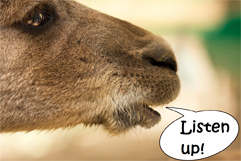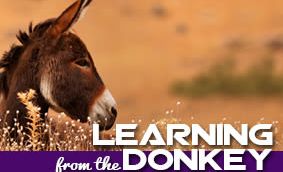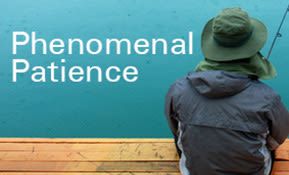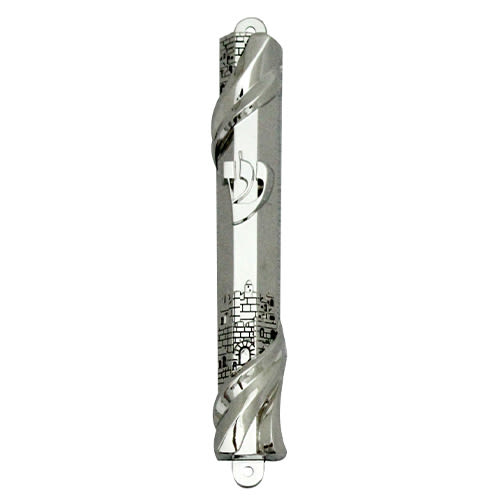
Balak: Listen Up!
When a person bangs his finger with a hammer, it's not because he's a clumsy carpenter. The hammer is Hashem's emissary, carrying some form of message...

"And Hashem opened the mouth of the donkey…" (Numbers 22:28).
When King David completed the Book of Psalms, the greatest best-seller in history, he naturally had a feeling of self-satisfaction, a little too much so considering his lofty spiritual level as Hashem's anointed. He said to Hashem, "Is there any creation in Your world that says songs and praises more than I do?" Hashem didn't answer him. Instead, The Holy One blessed be He sent an emissary – a little green frog – that suddenly leaped up to King David's lap and said to him: "David! Don't be complacent, for I say songs and praises more than you do. Not only that, but three thousand parables are said about every sonnet that I recite, for it is said (Kings I 5:12), 'And he spoke three thousand parables and his songs were one-thousand and five.' Not only that, but I involve myself in a great mitzvah, and this is the mitzvah that I involve myself with: There's a specie on the beach whose sustenance comes exclusively from (creatures that live) in the water, and when it's hungry, it takes me and eats me. I therefore fulfill the mitzvah of that what is said (Proverbs 25:21-22), 'If your adversary is hungry, feed him; if he's thirsty, give him water to drink, for you shall heap hot coals on his head and Hashem shall reward you.'[1]
Why would Hashem send a frog to chastise his chosen anointed King of Israel?
If to this day, Hashem derives the greatest gratification from a simple person who recites Psalms, imagine  how Hashem relished King David's lifelong singing of praise and gratitude, as recorded in the Book of Psalms. King David did not have an arrogant bone in his body. In Psalm 18, he calls himself “a worm and not a person at all.” Yet, when he finished Psalm 150 and completed the Book of Psalms, he felt a warm feeling of accomplishment. In his holy spirit of prophecy, he knew that future generations would all have his words on their lips. Yet, as an insurance policy to protect him from any slightest hint of arrogance, Hashem sent him a frog to both chastise him and to show that if a frog can outshine him in Divine service, then just imagine how the greater and more prestigious creations serve Hashem!
how Hashem relished King David's lifelong singing of praise and gratitude, as recorded in the Book of Psalms. King David did not have an arrogant bone in his body. In Psalm 18, he calls himself “a worm and not a person at all.” Yet, when he finished Psalm 150 and completed the Book of Psalms, he felt a warm feeling of accomplishment. In his holy spirit of prophecy, he knew that future generations would all have his words on their lips. Yet, as an insurance policy to protect him from any slightest hint of arrogance, Hashem sent him a frog to both chastise him and to show that if a frog can outshine him in Divine service, then just imagine how the greater and more prestigious creations serve Hashem!
As opposed to King David, the wicked Bilaam was the epitome of arrogance. Every other sentence, he reminded Balak and his emissaries that he speaks to Hashem all the time, face-to-face. He calls himself the “seer”, flaunting his powers of prophecy. Yet, as the Gemara tells us[2], the only reason Hashem gave the powers of prophecy to the smug and wicked Bilaam was to silence any future claim that the nations of the world might maintain, saying that if Hashem would have given them a prophet, they too could have reached the level of the Jewish People. As such, Hashem gave Bilaam spiritual powers that were even greater than what He gave Moses; the difference between them was that Moses used his powers selflessly, for the good of the nation and to serve Hashem, while Bilaam used his powers to fuel his greed and to feed his ego and his lust. As such, just when Bilaam thinks that he can understand and outguess Hashem, Hashem opens up the mouth of Bilaam's donkey to show him that he can't even see what his donkey sees.
Maybe we all laugh at Bilaam. When we get a little too conceited and start thinking that we're better than anyone else, Hashem sends us our own version of a donkey to put us in our place. For example, our sages say that when a dog barks at someone, that person probably spoke loshon hara, or slander, that day. The Gemara says that snakebites are the result of a person transgressing a rabbinical ordinance. On the other hand, seeing a hoopoe bird is a sign that one's prayers have been answered.
Not only animals and plants are Hashem's emissaries, but inanimate objects as well. When a person bangs his finger with a hammer, it's not because he's a clumsy carpenter. The hammer is Hashem's emissary, carrying some form of message, because everything comes from Hashem and everything Hashem does is both purposeful and for the very best. So, whether it's a frog, a donkey, a hoopoe bird or a hammer, Hashem is telling us, “Listen up! There's an important message here.” The stimuli and everyday occurrences of our lives are Hashem's way of communicating with us. Once we become aware of this important fact, life becomes ever so satisfying and meaningful.











Tell us what you think!
Thank you for your comment!
It will be published after approval by the Editor.